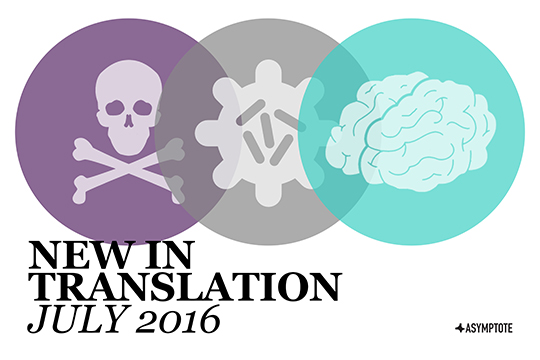“What else remains for an 85-year-old to do but repeat himself?” asks Jorge Luis Borges in the first volume of these conversations between the author of Ficciones and the poet and essayist Osvaldo Ferrari. Still playful a mere year before his death in 1986, Borges then offers a sly nod to the listener of these radio dialogues that can now reach English readers: “Or try variations, which comes to the same thing.” Such a remark recalls a classic Borges piece like “The Library of Babel,” with its intricately intertwined ideas of repetition and variation, and in his preface Ferrari even alludes to Borges’ “zenithal perception of everything,” suggesting that the author of “The Aleph” or “The Zahir” might resemble his own creations. Detecting such subtle intersections between page and personality can certainly serve as one entertaining way into this newly released—and both occasionally and charmingly repetitive—third volume of radio conversations published by Seagull Books. But these pages become truly fascinating as we encounter not one Borges but many: the poet, the critic, the writer of fictions that tend toward the philosophical, and, perhaps most importantly, the attentive reader capable of discovering some delight or insight on every page.
Posts by Sam Carter
In Review: Conversations (Volume 3) by Jorge Luis Borges and Osvaldo Ferrari

“Ferrari and I tried to let our words flow through us, perhaps despite ourselves" - Jorge Luis Borges
What’s New in Translation? July 2017
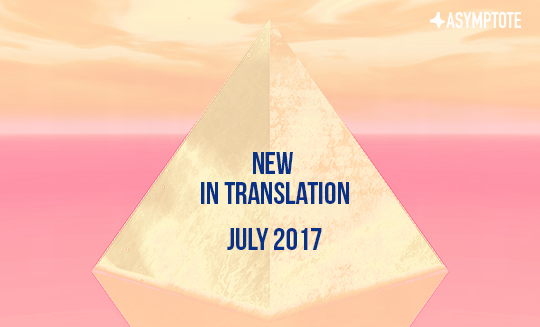
We review three new books from France, Turkey, and Switzerland that are available in English for the first time.
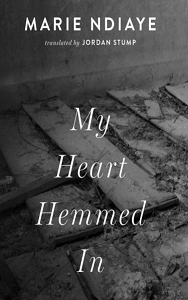
My Heart Hemmed In by Marie NDiaye, translated by Jordan Stump, Two Lines Press
Reviewed by Ah-reum Han, Writers on Writers Editor
Think: Charlotte Perkins Gilman’s The Yellow Wallpaper meets Han Kang’s The Vegetarian meets Elizabeth Strout’s Olive Kitteridge; then for good measure, throw in a bit of Na Hong-jin’s The Wailing. Marie NDiaye’s My Heart Hemmed In defies categorization. And yet, the novel’s crux lies in the unspoken categorization of its main characters—the schoolteacher couple, Nadia and Ange—who the townspeople have inexplicably (and violently) turned against. Not long after the reader arrives in this novel, Ange sustains a critical injury and Nadia must find a way to live in this new, hostile world. Told entirely from Nadia’s limited perspective, this forced intimacy between reader and paranoid narrator leaves us feeling curious, suffocated, and unsettled.
French literary star, NDiaye, has been my writer crush ever since Ladivine, which was longlisted for the 2013 Man Booker International Prize. She published her first novel when she was just eighteen years old and has since received the Prix Femina and the prestigious Prix Goncourt. Written in NDiaye’s distinctive, phantasmagorical style, My Heart Hemmed In is an unrelenting look inward in a world where the psychological manifests itself externally. Whether it’s the food Nadia devours or Ange’s mysterious, gaping wound, we are confronted with things that are consumed and the things they are consumed by; the things left for dead, and the things they birth. NDiaye’s details are so seductive and unforgiving, lavish and grotesque, it leaves you reeling.
What’s New in Translation? February 2017
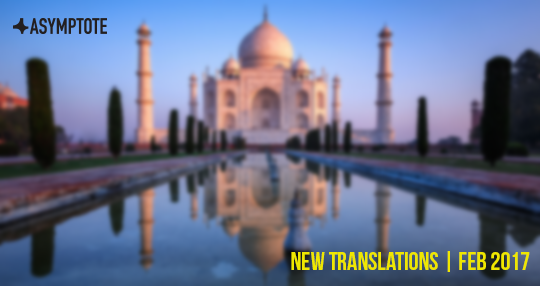
Asymptote reviews some of the best new books from French, Kannada, and Danish.
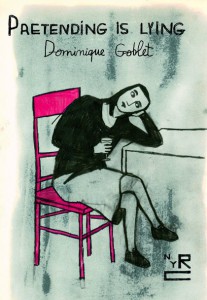
Pretending is Lying by Dominique Goblet, tr. Sophie Yanow, New York Review Books
Review: Sam Carter, Assistant Managing Editor
Dominique Goblet’s Pretending is Lying, translated by fellow cartoonist Sophie Yanow in collaboration with the author, immediately recalls the best work of those figures like Alison Bechdel, Adrian Tomine, and Chris Ware, who have done so much to insist on both the relevance and elegance of the graphic narrative form in the Anglophone world. Fortunately, New York Review Books is dedicated to showcasing the many voices contributing to an ongoing, worldwide comic conversation, and its latest contribution is this Belgian memoir. Originally titled Faire semblant c’est mentir, it centers on the experiences of Dominique—a fictionalized version of the author herself—as she navigates fraught relationships with her parents, including with her looming lush of a father. Also sketched out is a romantic relationship where Dominique attempts to grapple with that most fundamental question of heartbreak: why did he leave me?
A certified electrician and plumber, Goblet clearly understands a thing or two about the necessary connections running through structures to make them work, and her illustrations carry this skill into Pretending is Lying, her first work to appear in English. Image and text perform an intricate choreography, reveling in an aesthetic that frequently slips between the easily imitated and the utterly remarkable. If the easy analogy for reading comics is the process of examining a series of film stills—and even if we might be tempted to label parts of the construction of this work cinematic—I would instead suggest that Goblet offers something that more closely resembles a well curated series of photographs, each of which could easily stand on its own, given each frame’s clarity of vision and attention to detail.
In illustrations that move from Rothko-like explorations of pure color to nuanced collections of penmanship that gradually reveal a series of ethereal forms, the melancholia that we often find in other works emerges here as well—maybe there’s something about the form that lends itself well to expressions of such emotions in its ability to match words with alternatively visceral and measured strokes. The muted color palette of Pretending is Lying is also remarkably expressive. READ MORE…
New Year Reading Resolutions from the Asymptote team! (Part I)

From reading more small presses to children's literature in translation, here are our reading resolutions for 2017!
Sam Carter, Assistant Managing Editor
Rather than focusing on a single region in the coming year or trying to rectify one of my many reading deficiencies (such as an embarrassing lack of familiarity with Chinese or Arabic literature, to name just two), I will dedicate 2017 to exploring the work of those folks who are so dedicated to bringing us the best of world literature in book form: publishers. Not just any publishers, of course, but the small presses who tirelessly seek out the new voices that make the global literary conversation an exciting and ever-expanding one.
These small presses spread the wealth of work from across the globe, and my small contribution for the coming year will be to spread my meager wealth by monthly rewarding one of these risk-takers with the purchase of a recent release. This supplement to my regular habits will not only contribute a greater degree of diversity to my readings but also allow me to become better acquainted with the frequently impressive catalogs of these forward and outward looking publishers.

To guide my exploration, I’ll be adding a further constraint by starting with those presses located close to home and working outward. Because I’m based in Ithaca, NY, I’ll turn to nearby Rochester’s Open Letter Books for my January pick, which will be Lúcio Cardoso’s Chronicle of the Murdered House. A friend and inspiration to Clarice Lispector, Cardoso’s novel incorporates letters, diaries, and a variety of other documents from the characters in this sprawling tale of a family’s downfall.
Translation Tuesday: Five Poems by Benito del Pliego
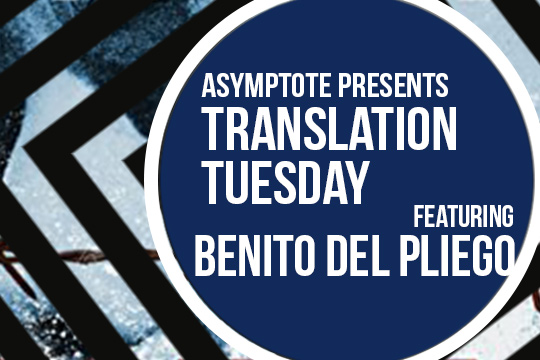
Destruction/satisfaction: everything is a question of measurement.
Openly encouraging an oracular approach in which readers pose questions to a series of poems and identify either themselves or others through the answers they obtain, Fable showcases Benito del Pliego’s familiarly deft touch as he places puns alongside paradoxes and striking images next to penetrating insights in moving explorations of isolation and recollection. Continuing a career-long commitment to fostering meaningful interactions between a text and its interlocutors—whether readers, accompanying illustrations, or other poems in the collection—this Spanish poet highlights the unfamiliar in the familiar and makes poetry about the everyday seem anything but ordinary. These poems are taken from the collection Fable / Fábula, recently launched at McNally Jackson Books in New York.
THE SALMON
—It’s hard to move forward when you only want to go against the current.
Later you discover that nothing remains, that the future has countless origins.
Sometimes you feel like a shipwrecked sailor; sometimes you think anyone who wants to flee never goes further than herself.
What’s New in Translation? November 2016
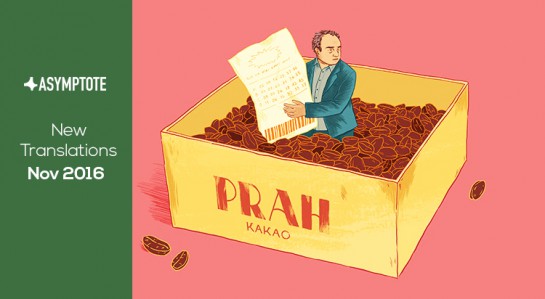
Asymptote reviews some of the best new books from French, Swedish, and German.
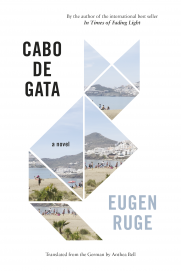
Cabo de Gata, by Eugen Ruge, tr. Anthea Bell, Graywolf Press
Review: Sam Carter, Assistant Managing Editor, US
First published in German in 2013—when his In Times of Fading Light appeared in English—Eugen Ruge’s Cabo de Gata, out this month from Graywolf Press, might strike a familiar note for readers who have witnessed a surge in autobiographically-inflected works that frequently take the production of fiction as a subject worthy of novelistic exploration. Hailing from both the Anglophone world and beyond, such novels record the process of their creation or the struggles to even begin them, and Ruge quickly aligns himself with this approach in his tale of a writer’s attempt to get away from it all in the hope of figuring something out. “I made up this story so that I could tell it the way it was,” declares the dedication to this slender volume, and a more precise formulation arrives soon after as the narrator recalls a period in which “I was testing everything that I did or that happened to me at the same moment, or the next moment, or the moment after that, for its suitability as a subject … as I was living my life, I was beginning to describe it for the sake of experiment.”
While in Cabo de Gata, a small town on the Andalusian coast, the narrator quickly settles into routines designed to simultaneously distract him from blank pages and provide him with some inspiration to fill them. The local fishermen, whom the narrator visits on his daily stroll, can empathize with such difficulties: ¡Mucho trabajo, poco pescado! A lot of work for only a little fish—it’s a piscatory philosophy that applies just as well to the writing life. Ruge, however, proves to be an exceptionally gifted angler as he reels in catch after catch in what would seem to be difficult waters, namely a single man’s short trip to this seaside village.
Serving as a metronome marking out the rhythm of memories that constitute the novel, a refrain of “I remember” begins many of the paragraphs that have been expertly rendered by translator Anthea Bell. Far from repetitive or reductive, such a strategy instead seems somehow expansive, particularly when we are reminded that, “fundamentally memory reinvents all memories.” Both the vagaries and the vagueness of memories—“I remember all that only vaguely, however, like a film without a soundtrack,” remarks the narrator in a line that will be hard to forget—serve as the subjects of reflection that find their counterpart in the rhythms of the sea and the surrounding Spanish countryside.
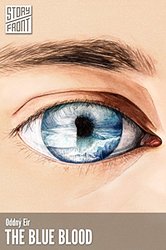
The Blue Blood by Oddný Eir, tr. Philip Roughton, Amazon’s Day One. Review: K.T. Billey, Assistant Editor
The Blue Blood seems simple: a woman wants to have baby. Motherhood has always been “in her cards.” She has found a partner who is game, and they love each other. They try everything, including multiple artificial inseminations from donors selected for their blue eyes—hoping the baby will approximate the father. Disappointment and hope begin to frame the narrator’s consuming obsession: finding someone who can help with ‘their problem.’ Her search for a donor expands into the world, as heartbreak and determination test the limits of her relationship. The reader is privy to the narrator’s pseudo-diary “As if recounting a clever story gives my life purpose…”
In a series of titled vignettes, The Blue Blood does more than chronicle the toll of dreams and bodily realities on our relationships. Blue is everywhere—signs, names, auras, eyes, oceans—a mystic slice reminiscent of Maggie Nelson’s Bluets, revolving around fertility and the windows to the soul. The reader experiences the writer’s symbology and suffers along with the woman struggling to read into and ignore them. We feel the weight of their accumulation, the damaging pressure. Desire and action are not enough. When is trying trying too hard? The nature of coincidence gets tangled with intimacy, confronting us with the what we cannot know, will, or hope into being. Of course the couple’s vacation to Argentina finds them in a mountain village with a Nazi past and many blue eyed specimens. Of course they cannot neuter the dog. READ MORE…
What’s New in Translation? November 2015
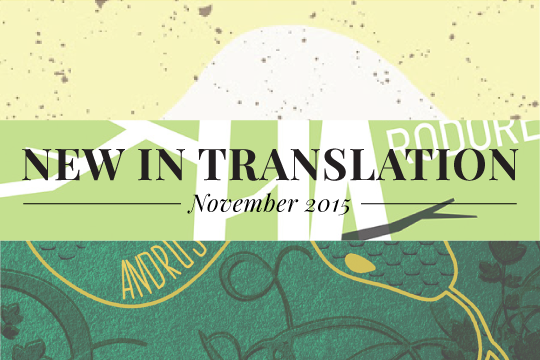
So many new translations this month! Here's what you've got to know—from Asymptote's own
War, So Much War by Mercè Rodreda, tr. Maruxa Relaño & Martha Tennent (Open Letter Books)—reviewed by Sam Carter, assistant managing editor

“The sleep of reason produces monsters,” reads one of the epigraphs to Mercè Rodoreda’s Quanta, quanta guerra, now available in English as War, So Much War from Open Letter Press. Drawn from the title of a famous Goya etching, it is a fitting prelude to a work that explores the ravages of war from a pseudo-picaresque perspective in which we find ourselves face-to-face with a narrator coming to terms with the unnerving and unending monstrosity of war, rather than encountering a delinquent carefully crafting a tale of struggle and self-justification. Even if this conflict initially resembles the Spanish Civil War, in his narration, protagonist Adrià Guinart insists on an ambiguity permeating all levels of the work and suggesting the plausibility of less localized interpretations.
In sparse prose, crisply translated by both Maruxa Relaño and Martha Tennent, Adrià recounts his interactions with the figures he meets throughout a journey that begins with an enthusiasm for the escapist possibilities of war and yet ends on entirely different note. His own narrative “I” proves elusive as it frequently disappears into a chorus of other voices that dominate the task of depicting a war-torn landscape. Describing the novel’s structure with another of its epigraphs—“A great ravel of flights from nothing to nothing,” from D. H. Lawrence—is ultimately too tempting to pass up, for it is precisely in its itinerant quality, in the way it moves from one episode to another without the need to establish definitive links, that the novel finds its strength. READ MORE…

